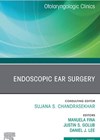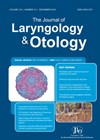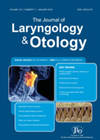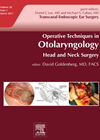
Journal Reviews
Lateral skull base surgery using the endoscope
Endoscopic lateral skull base surgery could be performed via less invasive techniques due to wide panoramic visualisation of the operative field. With less invasive techniques, patients have been shown to require shorter recovery time and reduced postoperative pain. In this...
Is canal wall down with obliteration a useful compromise between canal wall up procedure and open mastoid cavities?
Controversy has raged for many years between open mastoid cavity procedures and canal wall up techniques in terms of postoperative recidivism and ear discharge. It is generally believed that canal wall up procedures can miss hidden cholesteatoma but preserve useful...
Diagnostic performance of non-echo-planar diffusion weighted MRI in detection of suspected cholesteatoma
Even though a ‘second look’ remains a gold standard for detection of residual cholesteatoma after intact canal wall techniques, non-echo-planar diffusion weighted MRI is considered a reasonable alternative to avoid further surgery. However, to establish or exclude a cholesteatoma de...
Options for the endoscope and acquired cholesteatoma
This was a thought-provoking article examining the reasons why the authors believe that the endoscope is enabling an improved understanding of acquired cholesteatoma and its management. They describe in depth the ventilation pathways of the middle ear, and how they...
Evidence based outcomes for canal wall up, canal wall down and subsequent canal wall reconstruction for primary cholesteatoma
There has been a long standing controversy over whether to treat primary cholesteatoma with open or closed technique. The general consensus is that limited disease can be treated with closed technique whereas the canal wall down approach helps reduce recidivism...
Does a labyrinthine fistula in cholesteatoma surgery lead to hearing loss?
Thirty-five patients with labyrinthine fistula related to cholesteatoma were studied retrospectively. All patients underwent CT scans and preoperative hearing tests 1-2 weeks prior to surgery (averaged at 0.5, 1, 2, 3, 4, 8 kHz). All 35 patients underwent mastoid surgery,...











